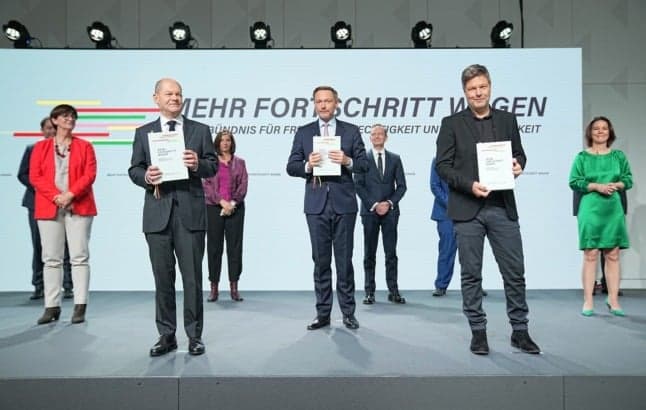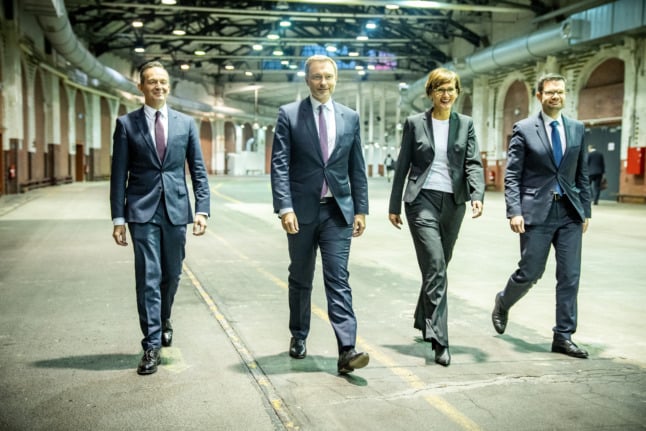Germany's 'traffic light' parties sign coalition agreement in Berlin

Two and a half months after the federal elections on September 26th, the three parties of the incoming 'traffic light' coalition - the SPD, Greens and FDP - have formally signed their coalition agreement at a public ceremony in Berlin.
The move marks the final stage of a 10-week week process that saw the three unlikely bedfellows forming a first-of-its-kind partnership in German federal government.
The SPD's Olaf Scholz is now due to be elected Chancellor of Germany on Wednesday and his newly finalised cabinet will be sworn in on the same day. This will mark the end of the 16-year Angela Merkel era following the veteran leader's decision to retire from politics this year.
Speaking at the ceremony in Berlin on Tuesday morning, Scholz declared it "a morning when we set out for a new government."
He praised the speed at which the three parties had concluded their talks and said the fight against the Covid crisis would first require the full strength of the new coalition.
Green Party co-leader Robert Habeck, who is set to head up a newly formed environment and energy ministry, said the goal was "a government for the people of Germany".
He stressed that the new government would face the joint challenge of bringing climate neutrality and prosperity together in Europe's largest industrial nation and the world's fourth largest economy.
Green Party leader Annalena Baerbock spoke of a coalition agreement "on the level of reality, on the level of social reality".
FDP leader Christian Lindner, who managed to secure the coveted role of Finance Minister in the talks, declared that now was the "time for action".
"We are not under any illusions," he told people gathered at the ceremony. "These are great challenges we face."
Scholz, Habeck and Lindner are scheduled to hold a press conference before midday to answer questions on the goals of the new government.
Breaking: the SPD, Greens and FDP have just signed a coalition agreement at a public ceremony in Berlin.
Olaf Scholz will become the new Chancellor in 24 hours. “Dare to make more progress” is the slogan of the three party coalition. pic.twitter.com/C9bv37aAym
— Trent Murray (@trent_murray) December 7, 2021
'New beginnings'
Together with the Greens and the FDP, Scholz's SPD managed in a far shorter time than expected to forge a coalition that aspires to make Germany greener and fairer.
The Greens became the last of the three parties to agree on the contents of the 177-page coalition agreement an in internal vote on Monday, following approval from the SPD and FDP's inner ranks over the weekend.
"I want the 20s to be a time of new beginnings," Scholz told Die Zeit weekly, declaring an ambition to push forward "the biggest industrial modernisation which will be capable of stopping climate change caused by mankind".
Putting equality rhetoric into practice, he unveiled the country's first gender-balanced cabinet on Monday, with women in key security portfolios.
"That corresponds to the society we live in - half of the power belongs to women," said Scholz, who describes himself as a "feminist".
READ ALSO: Scholz names Germany’s first gender-equal cabinet
The centre-left's return to power in Europe's biggest economy could shift the balance on a continent still reeling from Brexit and with the other major player, France, heading into presidential elections in 2022.
But even before it took office, Scholz's "traffic-light" coalition - named after the three parties' colours - was already given a baptism of fire in the form of a fierce fourth wave of the coronavirus pandemic.
Balancing act
Dubbed "the discreet" by left-leaning daily TAZ, Scholz, 63, is often described as austere or robotic.
But he also has a reputation for being a meticulous workhorse.
An experienced hand in government, Scholz was labour minister in Merkel's first coalition from 2007 to 2009 before taking over as vice chancellor and finance minister in 2015.
Yet his three-party-alliance is the first such mix at the federal level, as the FDP is not a natural partner for the SPD or the Greens.
Keeping the trio together will require a delicate balancing act taking into account the FDP's business-friendly leanings, the SPD's social equality instincts and the Greens' demands for sustainability.
Under their coalition deal, the parties have agreed to secure Germany's path to carbon neutrality, including through huge investments in sustainable energy.
They also aim to return to a constitutional no-new-debt rule - suspended during the pandemic - by 2023.

Volker Wissing (l-r), FDP General Secretary und designated Transport Minister, walks alongside Christian Lindner, FDP leader and designated Finance Minister, Bettina Stark-Watzinger (FDP), the incoming Education Minister, and Marco Buschmann, the incoming Justice Minister. Photo: picture alliance/dpa | Michael Kappeler
READ ALSO:
- KEY POINTS: Germany’s next government unveils coalition pact
- How the coalition agreement changes everyday life in Germany
Incoming foreign minister Annalena Baerbock of the Greens has vowed to put human rights at the centre of German diplomacy.
She has signalled a more assertive stance towards authoritarian regimes like China and Russia after the commerce-driven pragmatism of Merkel's 16 years in power.
Critics have accused Merkel of putting Germany's export-dependent economy first in international dealings.
Nevertheless she is still so popular at home that she would probably have won a fifth term had she sought one.
The veteran politician is also widely admired abroad for her steady hand guiding Germany through a myriad of crises.
Comments
See Also
The move marks the final stage of a 10-week week process that saw the three unlikely bedfellows forming a first-of-its-kind partnership in German federal government.
The SPD's Olaf Scholz is now due to be elected Chancellor of Germany on Wednesday and his newly finalised cabinet will be sworn in on the same day. This will mark the end of the 16-year Angela Merkel era following the veteran leader's decision to retire from politics this year.
Speaking at the ceremony in Berlin on Tuesday morning, Scholz declared it "a morning when we set out for a new government."
He praised the speed at which the three parties had concluded their talks and said the fight against the Covid crisis would first require the full strength of the new coalition.
Green Party co-leader Robert Habeck, who is set to head up a newly formed environment and energy ministry, said the goal was "a government for the people of Germany".
He stressed that the new government would face the joint challenge of bringing climate neutrality and prosperity together in Europe's largest industrial nation and the world's fourth largest economy.
Green Party leader Annalena Baerbock spoke of a coalition agreement "on the level of reality, on the level of social reality".
FDP leader Christian Lindner, who managed to secure the coveted role of Finance Minister in the talks, declared that now was the "time for action".
"We are not under any illusions," he told people gathered at the ceremony. "These are great challenges we face."
Scholz, Habeck and Lindner are scheduled to hold a press conference before midday to answer questions on the goals of the new government.
Breaking: the SPD, Greens and FDP have just signed a coalition agreement at a public ceremony in Berlin.
— Trent Murray (@trent_murray) December 7, 2021
Olaf Scholz will become the new Chancellor in 24 hours. “Dare to make more progress” is the slogan of the three party coalition. pic.twitter.com/C9bv37aAym
'New beginnings'
Together with the Greens and the FDP, Scholz's SPD managed in a far shorter time than expected to forge a coalition that aspires to make Germany greener and fairer.
The Greens became the last of the three parties to agree on the contents of the 177-page coalition agreement an in internal vote on Monday, following approval from the SPD and FDP's inner ranks over the weekend.
"I want the 20s to be a time of new beginnings," Scholz told Die Zeit weekly, declaring an ambition to push forward "the biggest industrial modernisation which will be capable of stopping climate change caused by mankind".
Putting equality rhetoric into practice, he unveiled the country's first gender-balanced cabinet on Monday, with women in key security portfolios.
"That corresponds to the society we live in - half of the power belongs to women," said Scholz, who describes himself as a "feminist".
READ ALSO: Scholz names Germany’s first gender-equal cabinet
The centre-left's return to power in Europe's biggest economy could shift the balance on a continent still reeling from Brexit and with the other major player, France, heading into presidential elections in 2022.
But even before it took office, Scholz's "traffic-light" coalition - named after the three parties' colours - was already given a baptism of fire in the form of a fierce fourth wave of the coronavirus pandemic.
Keeping the trio together will require a delicate balancing act taking into account the FDP's business-friendly leanings, the SPD's social equality instincts and the Greens' demands for sustainability.
Under their coalition deal, the parties have agreed to secure Germany's path to carbon neutrality, including through huge investments in sustainable energy.
They also aim to return to a constitutional no-new-debt rule - suspended during the pandemic - by 2023.

Volker Wissing (l-r), FDP General Secretary und designated Transport Minister, walks alongside Christian Lindner, FDP leader and designated Finance Minister, Bettina Stark-Watzinger (FDP), the incoming Education Minister, and Marco Buschmann, the incoming Justice Minister. Photo: picture alliance/dpa | Michael Kappeler
READ ALSO:
- KEY POINTS: Germany’s next government unveils coalition pact
- How the coalition agreement changes everyday life in Germany
Incoming foreign minister Annalena Baerbock of the Greens has vowed to put human rights at the centre of German diplomacy.
She has signalled a more assertive stance towards authoritarian regimes like China and Russia after the commerce-driven pragmatism of Merkel's 16 years in power.
Critics have accused Merkel of putting Germany's export-dependent economy first in international dealings.
Nevertheless she is still so popular at home that she would probably have won a fifth term had she sought one.
The veteran politician is also widely admired abroad for her steady hand guiding Germany through a myriad of crises.
Join the conversation in our comments section below. Share your own views and experience and if you have a question or suggestion for our journalists then email us at [email protected].
Please keep comments civil, constructive and on topic – and make sure to read our terms of use before getting involved.
Please log in here to leave a comment.